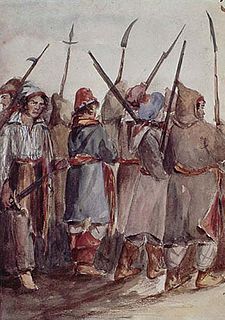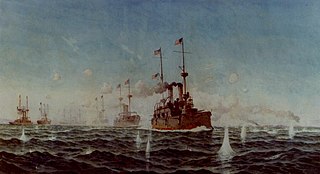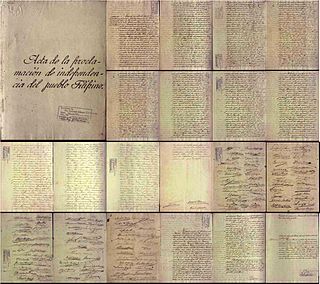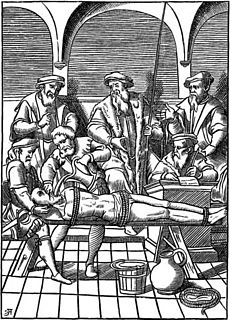 W
WThe Philippine–American War or the Filipino–American War, previously referred to as the Philippine Insurrection or the Tagalog Insurgency by the United States, was an armed conflict between the First Philippine Republic and the United States that lasted from February 4, 1899, to July 2, 1902. While Filipino nationalists viewed the conflict as a continuation of the struggle for independence that began in 1896 with the Philippine Revolution against Spain, the U.S. government regarded it as an insurrection. The conflict arose when the First Philippine Republic objected to the terms of the Treaty of Paris under which the United States took possession of the Philippines from Spain, ending the Spanish–American War.
 W
WThe .38 Special, also commonly known as .38 S&W Special, .38 Smith & Wesson Special, .38 Spl, .38 Spc,, or 9x29mmR is a rimmed, centerfire cartridge designed by Smith & Wesson.
 W
WThe 1900 United States presidential election was the 29th quadrennial presidential election, held on Tuesday, November 6, 1900. In a re-match of the 1896 race, incumbent Republican President William McKinley defeated his Democratic challenger, William Jennings Bryan. McKinley's victory made him the first president to win a consecutive re-election since Ulysses S. Grant had accomplished the same feat in 1872.
 W
WThe American Anti-Imperialist League was an organization established on June 15, 1898, to battle the American annexation of the Philippines as an insular area. The anti-imperialists opposed expansion, believing that imperialism violated the fundamental principle that just republican government must derive from "consent of the governed." The League argued that such activity would necessitate the abandonment of American ideals of self-government and non-intervention—ideals expressed in the United States Declaration of Independence, George Washington's Farewell Address and Abraham Lincoln's Gettysburg Address. The Anti-Imperialist League was ultimately defeated in the battle of public opinion by a new wave of politicians who successfully advocated the virtues of American territorial expansion in the aftermath of the Spanish–American War and in the first years of the 20th century.
 W
WBenevolent Assimilation: The American Conquest of the Philippines, 1899-1903 is a non-fiction book documenting the history of the Philippine–American War by Stuart Creighton Miller (1927–2010), a professor at San Francisco State University, published in 1982 by Yale University Press. The title refers to U.S. President William McKinley's "Benevolent Assimilation" proclamation of December 21, 1898, which used that term to characterize the U.S. occupation and administration of the entire group of the Philippine Islands, then in its early stages following the cession of sovereignty by Spain to the U.S. in the 1898 Treaty of Paris.
 W
WA bolo is a large cutting tool of Filipino origin similar to the machete. It is used particularly in the Philippines, the jungles of Indonesia, Malaysia and Brunei, as well as in the sugar fields of Cuba.
 W
WCamp Merriam, California was a U.S. military camp for American troops destined for the Philippines during the Spanish–American War. Located at the San Francisco Presidio, the camp, named after Major General Henry C. Merriam, the Commanding General of the Department of the Pacific. Camp Merriam was located on the hills just north of the Lombard Street entrance to the Presidio of San Francisco. The camp was established in 1898 to quarter and train volunteer soldiers from California, Iowa, Kansas, and South Dakota for service during the Spanish-American War.
 W
WCamp Merritt, California was a U.S. military camp used for the quartering and preparation of American troops destined for the Philippines during the Spanish–American War. Formerly a racetrack, it was named for General Wesley Merritt, the commanding general of the U.S. Voluntary Army forces and the Eighth Army Corps. The camp was located in San Francisco, California in an area approximately bounded by what is now Point Lobos Avenue (Geary), Fulton Street, First (Arguello) and Sixth Streets.
 W
WThe Philippine Republic, more commonly known by historians as the First Philippine Republic or the Malolos Republic, was an unrecognized independent sovereign state in the Philippines. It was formally established with Emilio Aguinaldo as president by proclamation of the Malolos Constitution on January 21, 1899, in Malolos, Bulacan, succeeding the previous Revolutionary Government of the Philippines. It endured until 1901. April 1, The First Philippine Republic was established during the Philippine Revolution against the Spanish Empire (1896–1897) and the Spanish–American War between Spain and the United States (1898). Following the American victory at the Battle of Manila Bay, Aguinaldo returned to the Philippines, issued the Philippine Declaration of Independence on June 12, 1898, and established successive revolutionary Philippine governments on June 18 and 23 of that year. In December, Sovereignty over the Philippines was transferred from Spain to the United States in the 1898 Treaty of Paris, making the United States formally the Philippines colonial power. The Malolos Constitution establishing the First Philippine Republic was proclaimed the following month. The Philippine–American War began in February 1899, eventually resulting in American victory.
 W
WThe Hong Kong Junta was an organization formed as a revolutionary government in exile by Filipino revolutionaries after the signing of the Pact of Biak-na-Bato on December 15, 1897. It was headed by Emilio Aguinaldo and included high-level figures in the Philippine revolution against Spanish rule who accompanied Aguinaldo into exile in the Crown Colony of Hong Kong from the Philippines.
 W
WIrregular military is any non-standard military component that is distinct from a country's national armed forces. Being defined by exclusion, there is significant variance in what comes under the term. It can refer to the type of military organization, or to the type of tactics used. An irregular military organization is one which is not part of the regular army organization. Without standard military unit organization, various more general names are often used; such organizations may be called a troop, group, unit, column, band, or force. Irregulars are soldiers or warriors that are members of these organizations, or are members of special military units that employ irregular military tactics. This also applies to irregular infantry and irregular cavalry units.
 W
WThe Katipunan, officially known as the Kataastaasan, Kagalanggalangang Katipunan ng mga Anak ng Bayan, was a Philippine revolutionary society founded by anti-Spanish colonialism Filipinos in Manila in 1892; its primary goal was to gain independence from Spain through a revolution.
 W
WLantaka or rentaka was a type of bronze portable cannon or swivel gun, sometimes mounted on merchant vessels and warships in Maritime Southeast Asia. It was commonly equipped by native seafaring vessels from Indonesia, Philippines, Brunei and Malaysia. Lela and rentaka are known by the Malays as meriam kecil, the difference is that rentaka is smaller in length and bore than a lela.
 W
WThis is the list of the Weapons used in the Philippine revolution.
 W
WThe Battle of Manila Bay, also known as the Battle of Cavite, took place on 1 May 1898, during the Spanish–American War. The American Asiatic Squadron under Commodore George Dewey engaged and destroyed the Spanish Pacific Squadron under Contraalmirante Patricio Montojo. The battle took place in Manila Bay in the Philippines, and was the first major engagement of the Spanish–American War. The battle was one of the most decisive naval battles in history and marked the end of the Spanish colonial period in Philippine history.
 W
WThe Military Order of the Carabao is a social club open to officers of the U.S. military and war correspondents who served in the Philippines or on overseas official military campaigns. The order was initially created to satirize the pompous and pretentious Military Order of the Dragon. Descendants of those eligible for membership are themselves eligible, regardless of military service. As of 2016 the annual dues were US$50.
 W
WMy Sad Republic is a 2000 Philippine English-language novel written by Filipino novelist Eric Gamalinda. The novel won for Gamalinda a Philippine Centennial Literary Prize in 1998. The 392-page novel was published by the Philippine Centennial Commission, the University of the Philippines Press, and the UP Creative Writing Center. My Sad Republic is the fourth novel written by Gamalinda. The theme of the novel is "love, obsession, and loss" occurring during the Philippine Revolution against the Spanish colonial regime of the Philippines, and during the Philippine–American War.
 W
WThe Philippine Declaration of Independence was proclaimed by Filipino revolutionary forces general Emilio Aguinaldo on 12 June 1898 in Cavite el Viejo, Philippines. It asserted the sovereignty and independence of the Philippine Islands from the colonial rule of Spain.
 W
WThe Revolutionary Government of the Philippines was an revolutionary government established in the Spanish East Indies on June 23, 1898, during the Spanish–American War, by Emilio Aguinaldo, its initial and only President. The government succeeded a dictatorial government which had been established by Aguinaldo on June 18, and which was dissolved and replaced by this government upon its establishment. This government endured until January 23, 1899, when the proclamation of the Malolos Constitution established an insurgent Philippine Republic government which replaced it.
 W
WThe Philippine Scouts was a military organization of the United States Army from 1901 until after the end of World War II. These troops were generally Filipinos and Filipino-Americans assigned to the United States Army Philippine Department, under the command of American commissioned officers. Philippine Scout units were given the suffix "(PS)", to distinguish them from other U.S. Army units.
 W
WRayadillo was a blue-and-white striped cotton fabric used to make the military uniforms worn by Spanish colonial soldiers from the mid 19th century until the early 20th Century. Known by the British as "pyjamas", due to their resemblance with sleeping garments, it was commonly worn amongst soldiers posted in overseas Spanish tropical colonies and later, Spanish Morocco and Spanish Guinea. It became popular after being worn during the Spanish–American War, and was later adopted by the Philippine Army. It also served as the summer uniform of the regular army in Spain until 1914.
 W
WThe Veterans of Foreign Wars (VFW), formally the Veterans of Foreign Wars of the United States, is an organization of U.S. war veterans, who, as military service members fought in wars, campaigns, and expeditions on foreign land, waters, or airspace. The organization was established twice separately, once by James C. Putnam on September 29, 1899, in Columbus, Ohio and also by Irving Hale on December 1, 1899 in Denver, Colorado. The current VFW Post 1 located in Denver is the oldest Post still in operation. VFW National is now headquartered in Kansas City, Missouri.
 W
WThe Federal State of the Visayas was a revolutionary state in the Philippine archipelago during the revolutionary period. It was a proposed administrative unit of a Philippines under a federal form of government.
 W
WWater cure is a form of torture in which the victim is forced to drink large quantities of water in a short time, resulting in gastric distension, water intoxication, and possibly death.
 W
W"The White Man's Burden" (1899), by Rudyard Kipling, is a poem about the Philippine–American War (1899–1902), which exhorts the United States to assume colonial control of the Filipino people and their country. Originally written to celebrate the Diamond Jubilee of Queen Victoria, the jingoistic poem was replaced with the sombre "Recessional" (1897), also a Kipling poem about empire.